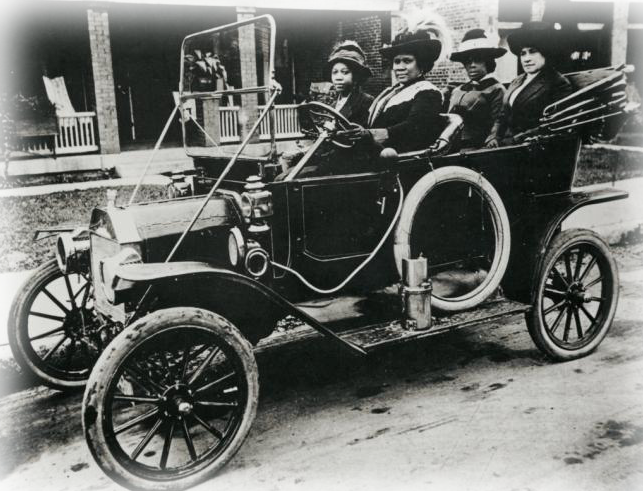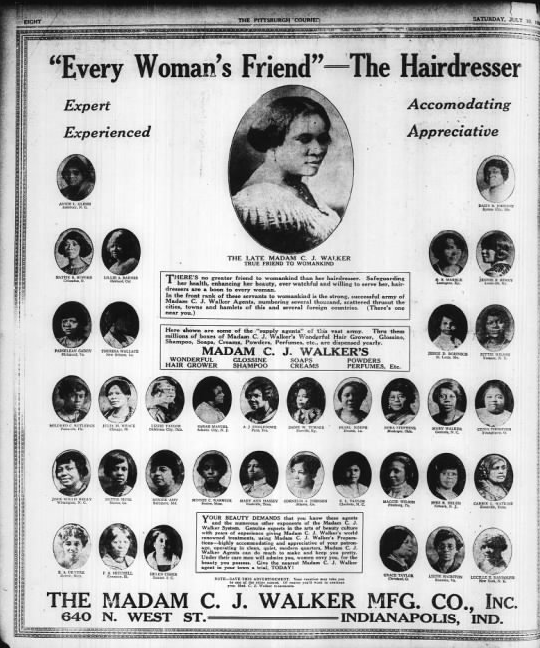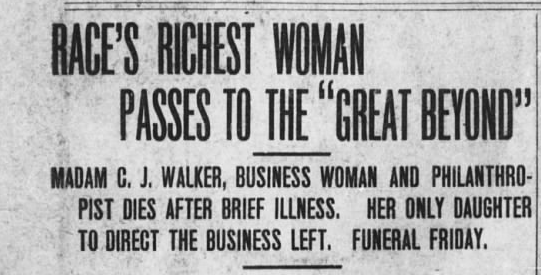In the early 1900s, Sarah Breedlove Walker’s dreams came true – literally. She had a dream where a man appeared to her and told her what ingredients to use to make a line of hair products for African-Americans. Her hair products were wildly successful, and Walker became the first African-American woman self-made millionaire and philanthropist.
Born in 1867 on a cotton plantation near Delta, Louisiana, Sarah was the daughter of freed slaves and orphaned at just 7-years-old. She married at age 14 and found herself widowed and a single mother by the time she was 22.

Struggling to survive, Sarah and her daughter moved to St. Louis where she worked as a laundress. Sarah earned just enough to send her daughter to school and took evening classes whenever possible. She married a second time, but the marriage ended in divorce.
About that time, Walker developed a scalp condition that led to hair loss. She tried a variety of remedies to cure the condition without success. Sarah got a job selling hair products and moved to Denver, Colorado where she met Charles J. Walker, who would become her third husband. He worked in advertising and later helped promote her business.
One night, Sarah had a dream where a man appeared to her and told her what products to use to create a new hair product. When she woke up, she mixed up the concoction and worked it into her scalp. After a few weeks, she noticed her hair was coming in faster than it had ever fallen out. The scalp problems that had plagued her cleared up. Sarah formed her own company in 1903, calling it “Madam C. J. Walker”.

The Madam C. J. Walker Company revolutionized hair care for African-American women. The company developed a system of hair care known as the Walker System and sold products directly to African-American customers. Sarah also hired a team of saleswomen, known as Walker Agents who used that direct sales model and worked door-to-door in their own black communities across the country. The company opened a beauty school in Pittsburgh followed by additional schools in other locations.
As the company grew, so did Sarah’s net worth. One year before women had the right to vote in America, Sarah became the country’s first female African-American self-made millionaire. She bought luxury homes including one called Villa Lewaro at Irvington-on-the-Hudson in New York. It was designed by black architect Vertner Taney, the first African-American registered architect in that state. It was located in an exclusive neighborhood. She also gave generously to multiple organizations including the NAACP, the black YMCA and funded scholarships at the Tuskegee Institute. In addition, she championed female employees and encouraged her employees to donate to local charities in their communities.

About a year after moving into Villa Lewaro, Sarah became sick while traveling. She died in 1919 of kidney failure caused by hypertension. The life of Madam C. J. Walker will be celebrated in an upcoming series set to premiere on Netflix this March. If you would like to learn more about Sarah Breedlove Walker, her amazing life and her company, Madam C. J. Walker, search Newspapers.com today!


Correction: Sarah “woke up” to steal Annie Malone’s hair care formula. Re Wikipedia:
“Due to the high demand for her [Annie Turnbo Malone’s] product in St. Louis, Turnbo opened her first shop on 2223 Market Street in 1902.[8] She also launched a wide advertising campaign in the black press, held news conferences, toured many southern states, and recruited many women whom she trained to sell her products.[2]
One of her selling agents, Sarah Breedlove Davis[3] (who became known as Madam C. J. Walker when she set up her own business), operated in Denver, Colorado until a disagreement led Walker to leave the company. Ms. Walker took the original Poro formula and created her own brand of it. This development was one of the reasons which led then Turnbo to copyright her products under the name “Poro” because of what she called fraudulent imitations and to discourage counterfeit versions.[2] Poro was a combination of the married names of Annie Pope and her sister Laura Roberts.[3] Due to the growth in her business, in 1910 Turnbo moved to a larger facility on 3100 Pine Street.[8]”
Malone, too, was one of the first African American women to become a millionaire. She was an honored and beloved philanthropist in St. Louis, supporting education and children’s welfare. And “Madame Walker” didn’t “dream up” that formula. She took it from Annie Malone.
——footnotes from Wikipedia———–
8 Trout, Carlynn, “Annie Turnbo Malone”, AAUW Columbia (MO) Branch. Accessed November 1, 2012.
2 “Malone, Annie”, The Freeman Institute.
^3 Whitfield, John H. (2016). “A Friend to All Mankind”: Mrs. Annie Turnbo Malone and Poro College. CreateSpace Independent Publishing Platform. ISBN 978-1507526026.
Thank u for that insight on Annie Malone , pale skin people don’t mention her in their history books , they make it seems as if cj walker was the only rich black woman of that time and only one who focused on hair care products , now u shed light on how she started her company, based on another woman’s creation , I love this kind of harsh truth , hope I can find some pictures of Annie , she deserves just as much credit in history as cj walker
Why does CJ deserve credit? For stealing a formula from another person? Also, “pale skin”?
This ‘pale-skinned’ woman is enjoying learning about both of these inteliigent, strong , and successful women. This pale-skinned woman is proud that they beat the odds and rose up to be an inspiration to all women, regardless of what their epidermis hue is. I’m looking forward to seeing the Netflix show on this fascinating and inspiring woman. She may have taken a formula, but she may have changed it to make it work better. And, she obviously was a saavy business woman, you can’t steal that! I wonder if her daughter was able to keep the business going successfully after Madame Walker passed?
This pale-face descendent of Norway, who is also a teacher of many African American students and plans to use this in her reading class as inspiration, agrees wholeheartedly with your comment. Racism works both ways and it’s still completely and viscerally unattractive. In any case, this is a wonderfully inspiring article.
Yes, I was like, “whaaaaaaat?!” I’m pretty sure you’re talking about Annie Malone.
Have you communicated w/ Netflix? Curious how their new series addresses the situation if at all.
I suspect this sort of “borrowing” (“dreaming?”) happened a lot back in the days before instantaneous or even regular communications.
This is a very interesting story, glad to read and can not wait to see the stories on TV.
Amazing women. I had her great, great granddaughter as a student when I taught at NCHS, Indpls. Wonderful legacy for the city of Indianapolis.
The terrible oversight in this story is that Ms. Walker had three brother who were barbers, who made the pomade/petroleum mix to heal an outbreak she had. Then she took it from there. She had men in her life who supported her. They were the source of her hair product.
I’m glad you mentioned Indianapolis, as I had always associated her with Indy, but didn’t see that city come up in the bio above. I’ll need to do some research to see how Indy fits into the equation.
https://indianahistory.org/education/educator-resources/famous-hoosiers/madam-c-j-walker/
Also interesting!!
Why take away from two women who moved up to the ranks of millionaires? They apparently were driven to succeed and any negative feedback is distasteful. They work through the system set up by men and succeeded. My hat is proudly off to them.
From another pale skinned woman.
This is crap. She had THREE BARBER BROTHERS WHO HELPED HER develop the product, not some man in dream. Damn they never stop.
Typo: Despite the misspelling in the linked Pittsburgh Press newspaper article, Pittsburgh, Pa., is spelled with an “h” at its end.
I believe that Pittsburg was the original spelling of the city, and the “h” at the end came later on.
Wikipedia has an interesting — and complicated — rundown on the spelling history. (-burgh relates to Scots English (as in Edinburgh, from the English “borough”), while -burg come from the German suffix for city.)
“The earliest known reference to the new name of the settlement is in a letter sent from General John Forbes to William Pitt the Elder, dated 27 November 1758, notifying Pitt that his name had been given to the place. In that letter, the spelling is given as “Pittsbourgh.” … The first recorded reference using the current spelling is found on a survey map made for the Penn family in 1769. In the city charter, granted on March 18, 1816, the Pittsburgh spelling is used on the original document, but due to an apparent printing error, the final ‘h’ is omitted on official copies of the document printed at the time.”
Then it gets complicated. 🙂
https://en.wikipedia.org/wiki/Name_of_Pittsburgh
True.
It is amazing that these Black Women accomplished what they did in that time and place in America. Today they would be celebrated the way Oprah Winfrey is. Back then they didn’t receive accolades in the press because it was dominated by White interests. The discrepancy of attribution for how the formulas were derived has more to do with the the fact that, “winners write history”. That is, until the truth is uncovered.
When checking into the Indianapolis connection to the Walker hair product check on The Ferguson Brothers Agency in that city. The Fergusons were millionaires, as well, from their association with the music business. My research indicates the Fergusons were involved with barber shops and salons at that time and most likely knew Walker and others named in this story.
The marketing materials give 640 West Street, Indianapolis as the headquarters of the company. Look down at the bottom of the poster/bill. Her marketing was really wonderful and she deserves all the credit for that! Most of us realize that there are the idea people and the doers/sellers, and credit should be given to both ladies and whatever men who were working in the background. Capitalism has brought so many people UP, we should credit it also.
More on her Indianapolis connection:
https://indianahistory.org/education/educator-resources/famous-hoosiers/madam-c-j-walker/
Wow, people’s incessant need to be right never ceases to amaze me. Both are wonderful stories about women who took advantage of opportunities and built success. Lots of people great ideas but either never execute them or excite them and fail miserably! They both have earned their place in history and deserve to be celebrated!
Just wondering if Great white guy is a millionaire? Sounds like he feels inferior. Perhaps he forgets his ancestors came from Africa. My family has been in this country since the 1600’s. While I am sure some have had racist attitudes, it is time to forget all that and come together as God’s creation. BTW, I am a “pale skin” whose ancestors fought in every war, even before 1776, since the then. I am a proud veteran of Viet Nam. Anyone, no matter what race who can accomplish what those women did, at that time should be applauded. God Bless all Americans, no matter their humble beginnings.